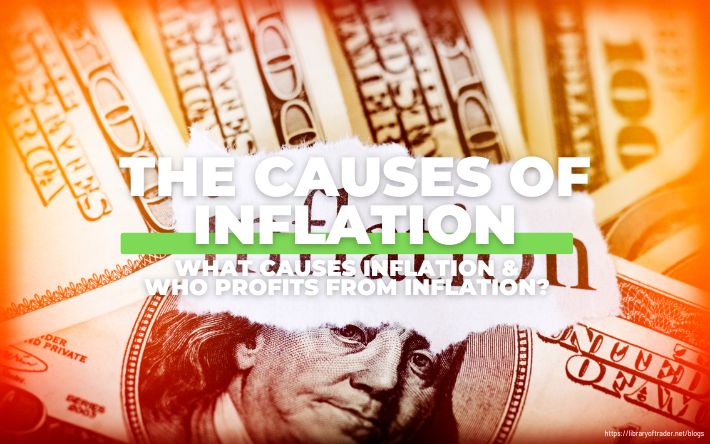You must have heard about inflation a lot these days when its effects on the stock market in particular and the economy, in general, have been enormous. The Pew Research Center analysis indicates that inflation rates have doubled in 37 of 44 advanced economies over the past two years. It is not exaggerating to say inflation is now one of the biggest concerns all over the world. In the U.S, inflation is rated as the nation’s top problem, and President Joe Biden has said addressing the problem is his top domestic priority. So, the causes of inflation, who causes inflation, who profits from inflation, and how exactly does inflation affect you?
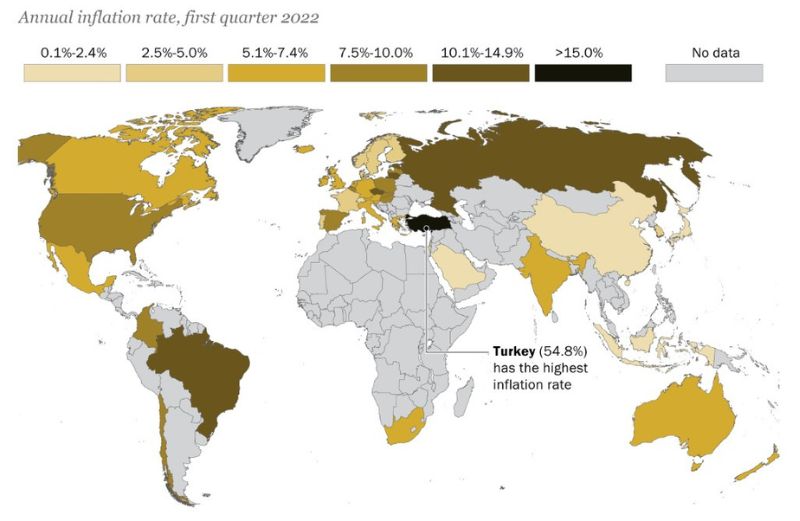
What Is Inflation?
Before getting a deep dive into the matter, let’s learn the basics about inflation first.
According to Wikipedia, inflation is a general increase in the prices of goods and services in an economy, which can be translated as the decline of purchasing power over time.
The rate at which purchasing power drops can be reflected in the average increase in prices of a set of selected goods and services within a period of time.
The rise in prices, which is often expressed as a percentage, means that a unit of currency does not effectively buy as much as it did in prior periods. The opposite of inflation is deflation, a sustained decrease in the general price level of goods and services, leading to an increase in purchasing power.
What Causes Inflation?
So, why does inflation happen? Here are the causes of inflation listed by Forbes.
Demand-Pull Inflation
Inflation happens when there is an increase in demand for goods and services but not enough of a corresponding increase in supply. Prices increase as in the short term, businesses can’t scale their production quickly enough to meet the demand.
Cost-Push Inflation
Not only an increase in demand but also an increase in production costs for businesses can drive prices up. If a large number of businesses take a toll from an increase in raw materials or labor costs and raise their prices, it can lead to an overall increase in prices and higher inflation rates.
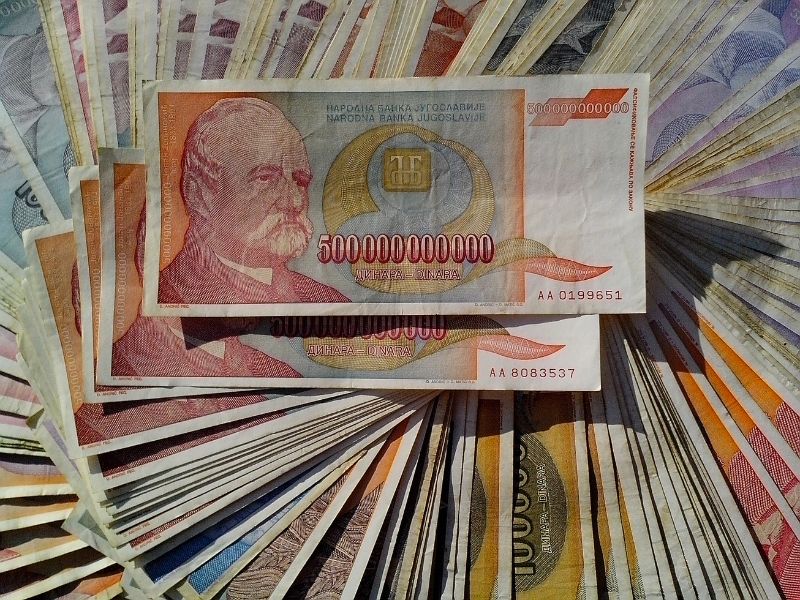
Devaluation
When a currency loses value in comparison to other currencies, imports become more expensive and that can lead to inflation. Imagine the U.S. dollar devaluing against the euro, businesses importing goods from Europe need to raise prices to cover the increased cost.
Rising Wages
This cause is controversial as not everyone agrees that higher wages for workers can lead to some consequences, particularly when it comes to raising the minimum wage for workers. Those who agree believe that when workers earn more money, they will spend more, hence increasing demand. Those who disagree say that increased minimum wage did not correspond with inflation hikes in the past.
Inflation Expectations
You might be surprised at who causes inflation. Sometimes we give a hand to make inflation worse as we are too worried about it. When we expect inflation, we might start acting accordingly. Workers might ask for higher wages, which ultimately leads to an increase in prices. Businesses might hike their prices to maintain their profit margins as they fear that raw materials might cost more.
In addition, increased money supply and policies and regulations are also the causes of inflation in economics.
Who Profits From Inflation?
While high inflation is generally considered harmful, some economists believe that a small amount of inflation is actually healthy for economic growth. But it is safe to say inflation benefits some businesses or individuals at the expense of others. Inflation simply means a rise in prices, which hurts the poor no matter what.
Investors are among those who benefit the most from inflation if they hold assets in markets affected by inflation. For example, if you have invested in energy companies, you might see a rise in your stock prices if energy prices are rising.
Businesses can also reap the rewards of inflation when there is a surge in demand for their goods. Inflation provides firms with pricing power and increases their profit margins if their prices increase faster than production costs do. When inflation occurs, businesses can also deliberately withhold supplies from the market, allowing prices to rise to the desired level.
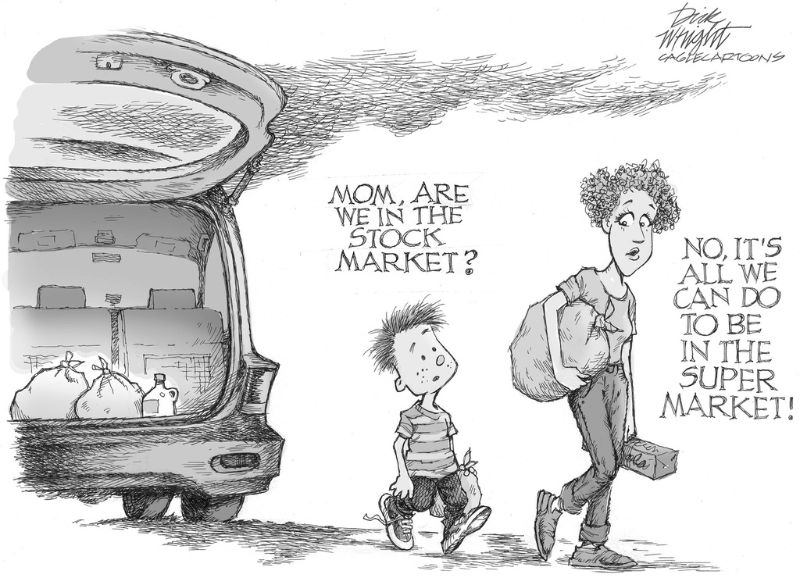
10 Common Effects of Inflation
1. Lowers Purchasing Power
This is inflation’s primary and most pervasive effect as it reduces the purchasing power of consumers. When our dollar will not go as far tomorrow as it did today, we lose interest to buy the goods or services.
2. Hurts the Poor the Most
With no inflation hedge such as real estate and less of a cushion against the loss of purchasing power inherent in inflation, lower-income consumers are those who are hit the hardest during inflation.
3. Deters Deflation
Deflation might be good for consumers but overall, the decline in prices can be much more destabilizing than comparable inflation. Therefore, governments often aim for inflation of 2% over the long run.
4. Causes Inflation Expectations When High
If the inflation rate is stable, it’s mostly background noise. But once it sharply rises and stays high, expectations of future inflation will eventually start to rise accordingly.
5. Hikes Interest Rates
In an attempt to cool off inflation, governments often raise interest rates, which makes it more expensive to borrow money for everyone.
6. Reduces Debt Service Costs
Who profit from inflation include those with fixed-rate mortgages and other loans as they now can repay these with inflated money, lowering their debt service costs after adjusting for inflation.
7. Fasten Economic Growth in the Short Term
As inflation erodes the purchasing power of the savings over time, it encourages consumers to spend and businesses to invest, which leads to a decline in unemployment. Therefore, for a short amount of time, inflation can stimulate demand while lowering inflation-adjusted labor costs, fueling job gains.
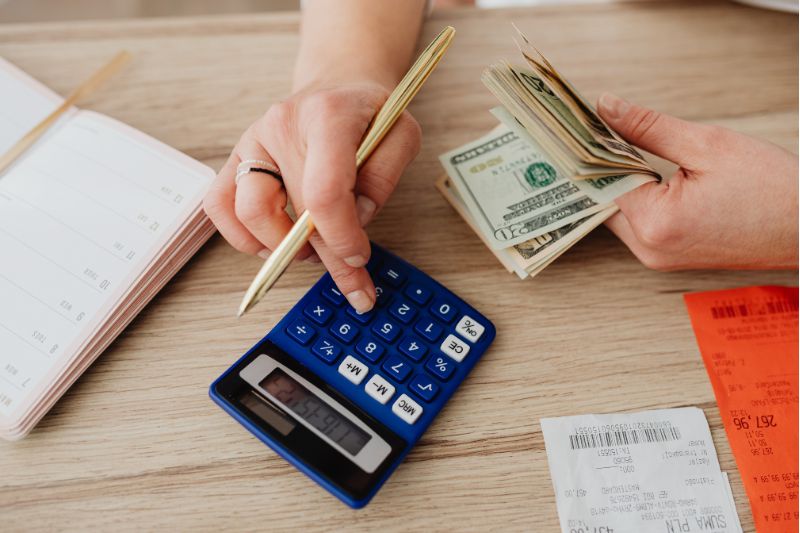
8. Causes Recessions
Does inflation cause recessions? Yes, painfully! When inflation expectations continue to rise, an inflationary spiral of price hikes and pay increases might happen as it did in the U.S. during the stagflation of the 1970s. The increased interest rates remained high for a long time, causing unemployment to soar.
9. Hurts Growth Stocks and Bonds
As bonds provide regular interest income at a fixed rate, those who invest in bonds will take a toll when inflation happens. Inflation also hurts growth stocks, which tend to be more expensive as it discounts the present value of their future cash flows more heavily.
10. Uplifts Real Estate, Energy, Value Stocks
These stocks have historically outperformed during episodes of high or rising inflation.
What Are the Different Types of Inflation?
The three different types of inflation include: Demand-Pull, Cost-Push, and Built-in inflation.
Demand-pull Inflation: An excess demand in the market that supply cannot meet alongside a low or falling unemployment rate is what causes inflation in an economy. The main causes for this type of inflation are often rising wages, rising house prices, and low-interest rates.
Cost-push Inflation: An increase in the cost of production is another cause of inflation as an increase in prices of the inputs (labor, raw materials, etc.) increases the price of the product.
Built-in Inflation: This type of inflation is the consequence of the expectation of future inflation. It is connected to consumer expectations as mentioned above.
What Is Deflation?
Deflation is the opposite of inflation as it is a decrease in the general price level of goods and services.
Deflation occurs when the inflation rate falls below 0% (a negative inflation rate), which means you can buy more goods or services tomorrow with the same amount of money you have today. On its face, deflation benefits consumers while harming borrowers and any financial market participants.
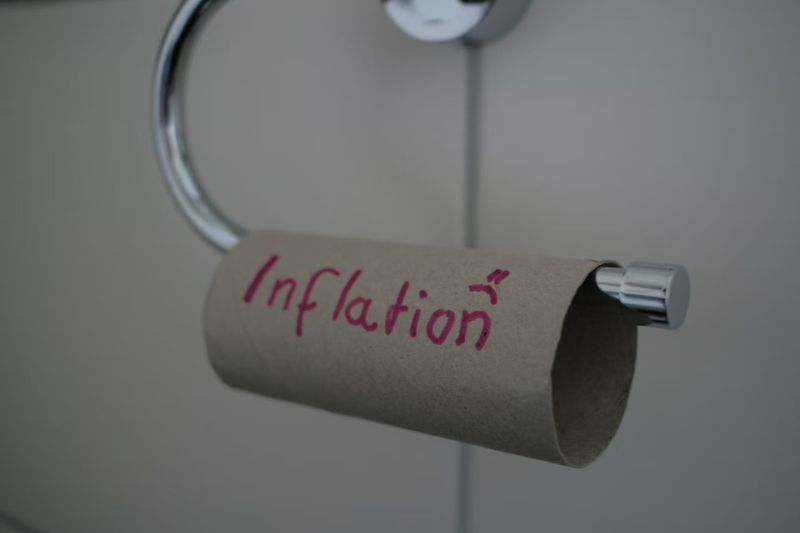
The ongoing inflation is not going away anytime soon. According to Preston Caldwell, head of U.S. economics at Morningstar, prices will remain high for the rest of 2022 but are expected to fall dramatically in the next two to three years.
That means we have to live with inflation for a couple of years. I hope with this blog you have learned the causes of inflation, its impact on the economy in general and on you in particular, as well as how to deal with it.
When the markets are too volatile to invest in, it is time to check out our courses for stocks, Forex, crypto, futures, and options to build up the needed knowledge for a strong comeback later.
FAQ
How to Measure Inflation?
Produced by the Bureau of Labor Statistics (BLS), the Consumer Price Index (CPI), the most well-known indicator of inflation, measures the percentage change in the price of a basket of goods and services consumed by households.
To find the CPI in any year, divide the cost of the market basket in that particular year by the cost of the same market basket in the base year and multiply the result by 100 to get the inflation rate percentage.
What Can Governments Do to Counter Inflation?
When inflation occurs, governments can use wage and price controls to fight it off. Here are some ways to cool down inflation governments can apply:
- Raise interest rates: to make it more expensive to borrow money.
- End or limit programs causing inflation and avoid adding more to the deficit.
- Lower costs for Health Care: One study indicates that each percentage point reduction in Health Care costs would reduce the inflation rate by 5 to 15 basis points.
- Reform the Tax Code: Tax increases can reduce demand, hence easing inflation.
- Reduce discretionary spending, consumption-oriented spending, and aid to states.
- Improve labor supply, capital supply, productivity, and personal savings.
- Lower costs for energy, trade, and procurement.
How to Protect Yourself from Inflation?
With the causes of inflation listed above, you can easily realize that there is not much we can do to avoid it. So the only thing we should do is to learn ways to limit the losses during inflation. Inflation can make it more expensive to buy the goods and services you could afford easily before. Therefore, here are some steps to protect yourself from the effect of inflation:
- Create a high-flow savings account. As your money is losing value, you should put them into a high-yield savings account to earn a higher annual percentage yield (APY).
- Invest in the stock market. As stated above, stock investors can actually make a profit from inflation. However, investing involves risks, equip yourself with the right knowledge and tools provided in these stock trading courses before putting any money into the market.
- Diversify Your Portfolio. One important rule in investing: never put all your eggs in one basket. To minimize your losses, diversify your portfolio with other assets such as stocks, and bonds.
Safeguard Yourself Against Inflation By Investing in Fine Wine!
Fine wine gets better with age, and it is a profitable way to survive rising inflation. As fine wine outperforms the global Consumer Price Index Inflation or CPI inflation, it can be a good inflation hedge.
Fine wine prices are not affected by inflation rates and they are also immune from market turmoil. In 2021, the average price of fine wines increased by 23%, while the U.S. annual inflation rate was about 5%. Not to mention that the volatility of fine wine markets is extremely low. The longer you keep a wine, the less volatile it becomes.
What Caused Inflation in 2022?
As there was no consensus among economists yet, the causes of inflation in 2022 might be:
- Monetary policy: Stanford economist John B. Taylor and Johns Hopkins economists Steve Hanke and Nicholas Hanlon believe that the large increase in the money supply was the main cause of inflation in the U.S. as M2 grew at a monthly rate of between 22% and 31% in the early months of the pandemic in 2020.
- Supply chain crisis: The COVID-19 pandemic caused global supply-chain problems that led to product shortages.
- Price gouging: Major industries, especially retailing, had been concentrated into oligopolies that dominated markets and consequently wielded higher pricing power for decades.

